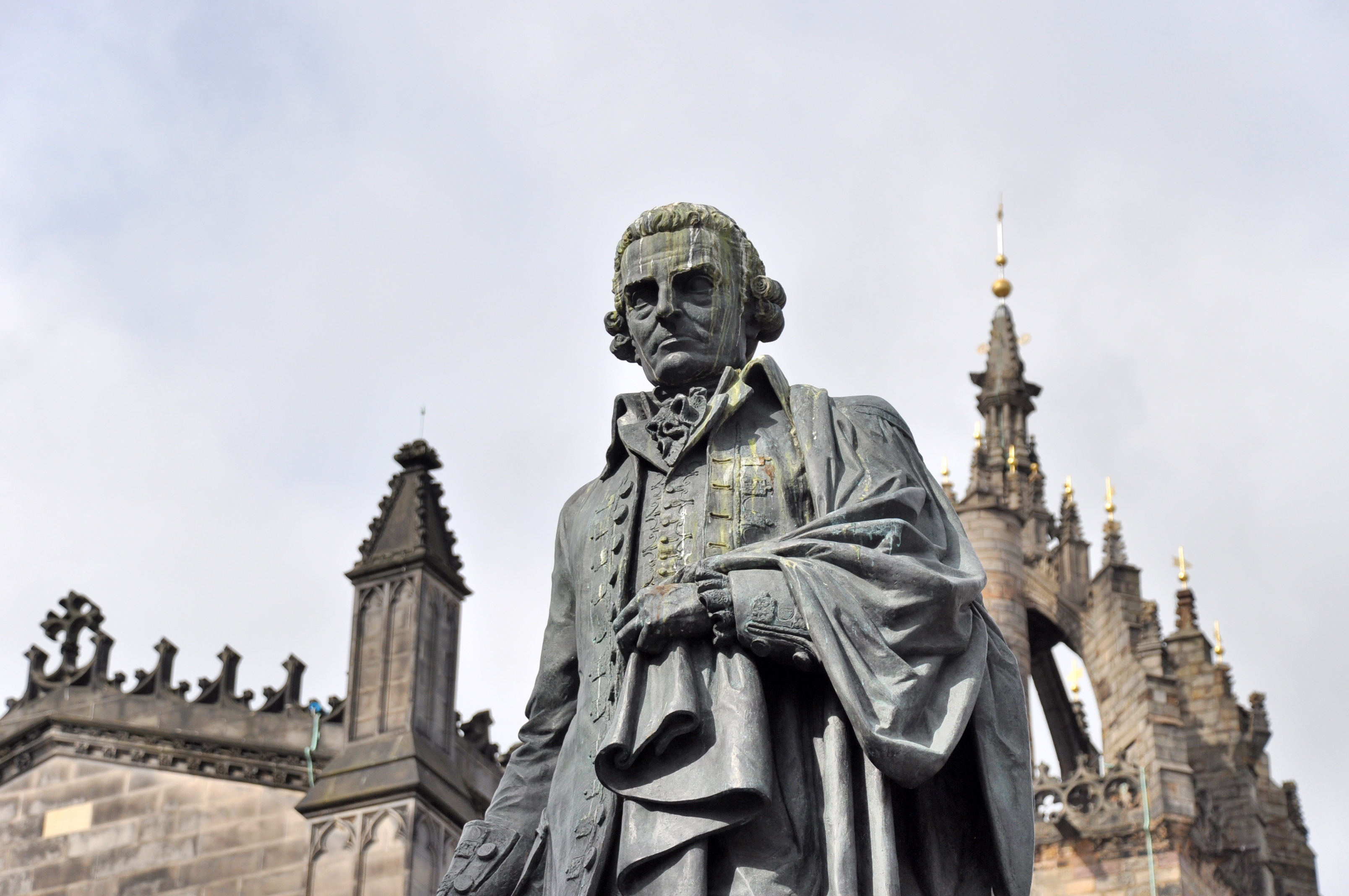Smith did not advocate a single-minded pursuit of profit
On 5 June 2023, we celebrate the 300th anniversary of the birth of the father of modern economics. The University of Glasgow Professor Adam Smith is more associated with free markets and national wealth than moral values. His two seminal works, The Theory of Moral Sentiments (TMS 1759) and The Wealth of Nations (WN 1776) appear to diverge in subject matter: morality versus self-interest. But a deeper reading reveals that the two works complement rather than contradict. Viewing Smith’s ideas through the narrow lens of modern economics as selfishness versus altruism not only oversimplifies his profound reflections but also diminishes his significance as a font for business ethics. In the 21st century, we need to move beyond the narrow perspectives into a holistic assessment of this quintessential moral philosopher of commercial society.
A common misunderstanding of Adam Smith’s ideas lies in the narrow interpretation of “self-interest” as synonymous with profit. Smith did not advocate a single-minded pursuit of profit but rather believed that individuals, in pursuing their own self-interest, would unintentionally contribute to the greater social good of society. His “invisible hand” is the systemic unintended consequence of individual action, not as an external force, but as an inner morality within each person that aligns with their human nature.
It is crucial to recognize that his analogy of the “invisible hand”, which many economists simply identify as the invisible hand of the market, is actually not just outside of individuals but within them. Smith first used the term in his writing on Astronomy to explain natural phenomena. In TMS, he employs this metaphor to describe the inner or impartial observer within each of us, guiding our moral sentiments. What is invisible is the outcome of one’s own inner nature manifested in outer self-order.
However, the concepts of the “invisible hand” and “self-interest” are nearly always generalized as “laissez-faire” beyond Smith’s original uses. This limited understanding of Smith’s economics arises from selectively focusing on specific lines from “The Wealth of Nations” and his singular reference to the invisible hand, without considering their broader context within Smith’s methodology and concerns. These isolated excerpts are then interpreted as justifying free markets and minimal government. Such simplification presents Smith as reducing all motivations to self-interest and regarding all self-interest as the vice of selfishness. Consequently, Smith is erroneously depicted as endorsing not just amoral economics but an anti-moral one, as if the selfish utility-maximizing concept of homo economicus prevalent in contemporary orthodox economic theory can fully explain human complexity.
Such current interpretations are misinterpretations of his noble work. By mistakenly equating self-interest with profit maximization and viewing the invisible hand as an external force, the economic system has become massively imbalanced, preventing individuals from maximizing their true self-interest and resulting in collective peril. Beyond a certain point, accumulating more profit or money does not enhance the quality of life. Instead, the relentless pursuit of accumulation often leads to misery.
Smith recognized this truth and understood that when one disregards the inner guidance of the impartial spectator or the invisible hand, they find themselves trapped in unhappiness and anxiety. Acting in accordance with propriety meant heeding one’s intuition. As Smith puts it in TMS,
from the observation of this propriety arose the happiness and the glory, from the neglect of it, the misery and disgrace of human nature. (Part VI, Section II, Chapter II)
We cannot maximize our happiness by just maximizing wealth, as high rates of anxiety and depression in rich societies plus growing social inequality and climate injustices testify. We need moral sentiments to bind humanity.
One crucial aspect which Smith understood but many interpreters have overlooked is that one can only maximize self-interest when one is self-realized. In WN, Smith highlighted how the three orders of landowners, laborers, and employers frequently lack knowledge about their true self-interests. He cautioned against proposals from profit-seeking employers, whose interests do not always align with those of society.
Indian sages shared a similar perspective. The Bhagavad Gita, a revered Indian text, states that when individuals follow their Swadharma (action in harmony with one’s true nature), it leads to maximum benefit for both society and the self. Swadharma aligns with Adam Smith’s concept of the invisible hand. However, Indian sages, like Smith, also recognized that people are often not self-realized enough to fully maximize their self-interest. As a result, they provided education and training on self-realization. Texts like the Vigyan Bhairav Tantra present 112 ways of self-realization. Integral Yoga by Indian saint Sri Aurobindo is another example of Indian texts about training on self-realization and cultivating the inner psychic being.
The point we make is that the invisible hand cannot be strengthened by free markets alone, but by cultivating wisdom, virtues, and self-realization at the individual level. These qualities can liberate individuals to follow the guidance of their inner selves and ultimately contribute to the well-being of humankind. Outer development has to be balanced with inner development. In TMS, Adam Smith wrote,
By acting according to the dictates of our moral faculties, we necessarily pursue the most effective means for promoting the happiness of mankind. (vol. II, page 316)
Thus, three centuries later, Adam Smith’s writing, principles, and reasoning remain eternal. His ideas of the invisible hand and maximizing self-interest, when properly understood, offer valuable insights into the relationship between individuals and society. The true essence of Adam Smith’s economic reasoning and the concept of the invisible hand is not about the pursuit of profit at all costs but rather about the importance of balancing self-interest with a wider perspective and recognizing the interdependence of individuals and society. These ideas are not conduits for individualistic greed, insatiable desires, or envy, but instead offer a way towards a more compassionate and informed society - something the world desperately needs.
The tercentenary anniversary of Adam Smith offers us an auspicious occasion to accord his work the significance it merits. As Amartya Sen puts it, “While some men are born small and some achieve smallness, it is clear that Adam Smith has had much smallness thrust upon him.” By honoring Adam Smith for his deep understanding, and correcting for all the misinterpretations surrounding his work, we can pay homage to his legacy and give apologies where it is justly due.
Acknowledgement
The authors would like to express gratitude to Prof. John Crawford for his insightful comments and suggestions that contributed to the improvement of this work.
References
“Adam Smith - Wikipedia.” Adam Smith - Wikipedia, 20 Dec. 2019, en.wikipedia.org/wiki/Adam_Smith.
Adam Smith. [1759-1790] 1976. The theory of moral sentiments (TMS). Eds D. D. Raphael and A. L. Macfie. Indianapolis: Liberty Press.
Adam Smith. [1776-1791] 1976. An inquiry into the nature and causes of the wealth of nations (WN). Eds. R. H. Campbell, A. S. Skinner. Indianapolis: Liberty Press.
Amartya Sen. 2010. “Adam Smith and the contemporary world.” Erasmus Journal for Philosophy and Economics 3 (1): 50-67.
Aurobindo, Sri. The Integral Yoga: Sri Aurobindo’s Teaching and Method of Practice. Edited by Sri Aurobindo Ashram Archives and Research Library S, 1993. Bowker, https://doi.org/10.1604/9780941524766.
Mandeville, Bernard. 1714. Fable of the Bees: or, Private Vices, Public Benefits
Paul A. Samuelson, Economics, First Edition, Fifth Impression. New York: McGr Hill, Inc., 1948
Shiva, Lord, et al. Vigyan Bhairav Tantra: The Only Great Book of Meditation, Concentration and Self Realisation. 2020.






